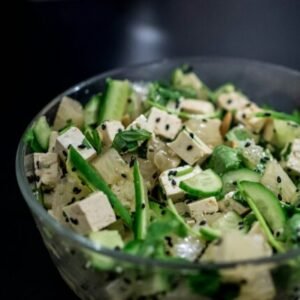Medically reviewed by Dr. Ramesh Gaddam, M.D. — Written by Sumalatha, D.N.H.E
Table of Contents
ToggleAnastrozole is a medicine used to treat estrogen-positive breast cancer by lowering estrogen levels in the body especially after menopause.
While it can be effective, managing side effects through diet is crucial. Certain foods may interfere with the treatment or worsen side effects.
This article will highlight which foods to avoid while taking anastrozole, emphasizing the importance of a balanced diet.
Making informed food choices can help support your health and enhance the effectiveness of your treatment.
1. How Anastrozole Works?

Anastrozole works by lowering the amount of estrogen in the body. This can help slow or stop the growth of certain types of breast cancer that rely on this hormone.
Anastrozole is often taken as a daily pill and is part of a treatment plan that may include surgery or radiation.
Regular check-ups with a doctor are important while using this medication.
Common Side Effects
While taking anastrozole, some people may experience side effects. Common ones include:
- Fatigue: Feeling unusually tired or weak.
- Hot Flashes: Sudden feelings of warmth, often followed by sweating.
- Gastrointestinal Issues: Problems like nausea, constipation, or diarrhea.
- Joint Pain: Discomfort or stiffness in the joints.
Understanding these effects can help you manage them better.
2. Basic Dietary Guidelines
Eating a balanced diet is important for everyone, especially for those undergoing treatment with anastrozole.
Good nutrition can help manage side effects and support your overall health.
Focus on including a variety of foods in your meals, such as:
- Fruits and Vegetables: Rich in vitamins and minerals, they boost your immune system.
- Whole Grains: Foods like brown rice and whole grain bread provide energy and fiber.
- Lean Proteins: Options like chicken, fish, beans, and nuts help build and repair tissues.
- Healthy Fats: Sources such as olive oil and avocados support heart health.
By choosing healthy foods, you can feel better and help your body respond to treatment.
3. Foods to Avoid when taking Anastrozole
Following are the foods and drinks to avoid when taking anastrozole to avoid interaction and side effects.
1. Alcohol
Drinking alcohol can affect how your body handles anastrozole, which may lead to more side effects.
It can also influence your estrogen levels, potentially reducing the effectiveness of the treatment.
Additionally, alcohol can cause dehydration and worsen feelings of fatigue or discomfort.
For these reasons, it’s best to limit or avoid alcohol while taking anastrozole to support your health and treatment outcomes.
2. Soy Products
Foods such as soy milk, tofu, and soy protein contain natural compounds that can act like estrogen in the body.
This might disrupt the action of anastrozole, making it less effective in lowering estrogen levels.
Because of this potential interaction, it’s wise to limit or avoid soy products while on this treatment to ensure the best possible results.
3. High-Fat Meats
It’s important to limit red meat, processed meats, and fatty cuts of poultry.
These types of meat can lead to inflammation in the body and may be connected to cancer growth.
Choosing leaner protein options, like chicken breast or fish, can help support your health during treatment.
Making these dietary changes can contribute to better overall well-being.
4. Certain Oils
It’s best to avoid oils such as safflower, sesame, corn, and soybean oil.
These oils can disrupt hormone balance in the body and may increase inflammation.
Instead, consider using healthier fats like olive oil or avocado oil, which can be better for your overall health.
Making these simple swaps can help support your treatment and well-being.
5. Citrus Peels and Pith
Grapefruit and its juice can interfere with how anastrozole works, potentially reducing its effectiveness.
It’s important to be careful with other citrus fruits, such as lemons and limes, as they might also have similar effects.
To ensure the best results from your treatment, it’s wise to limit or avoid these fruits during your time on anastrozole.
6. Processed Foods
Many packaged snacks, such as cookies, chips, and fast food, are often high in sugar and unhealthy fats.
Consuming these foods can lead to weight gain and increase inflammation in the body.
To support your health while on anastrozole, it’s best to limit these items and choose fresh, whole foods instead.
Making healthier choices can help improve your overall well-being during treatment.
7. Grilled or Charred Foods
Foods that are grilled or smoked can create harmful compounds that might negatively impact your health.
These cooking methods can lead to increased inflammation in the body.
To support your treatment, it’s a good idea to limit grilled and charred foods and consider healthier cooking methods, like baking or steaming.
Making these adjustments can help you feel better during your time on anastrozole.
8. Shellfish
Some types of shellfish may contain toxins that can interfere with the effectiveness of your treatment.
Eating these foods could pose risks to your health while on anastrozole.
To ensure the best results from your therapy, it’s wise to limit or avoid shellfish during this time.
Opting for safer protein sources can help support your overall well-being.
3. Specific Food Groups to Limit or Avoid
Sugary Foods:
High sugar intake can lead to increased inflammation in the body.
This can worsen side effects and impact your health.
It’s best to limit sugary treats like candy, sugary drinks, and pastries to support your treatment.
Dairy Products:
Dairy foods can contain hormones that may affect estrogen levels in the body.
Consider limiting dairy and exploring alternatives like plant-based milks, which can provide similar nutrition without the potential hormone influence.
High-Carbohydrate Foods:
Refined grains, such as white bread and pasta, can cause spikes in blood sugar levels.
These fluctuations can affect your energy and overall health.
Choosing whole grains instead can help maintain stable blood sugar and provide better nutrition.
5. Managing Side Effects Through Diet
Eating a healthy diet can help manage side effects while taking anastrozole.
Soluble Fiber:
Foods rich in soluble fiber, like oats, beans, and fruits, are important for gastrointestinal health.
They can help with digestion and reduce issues like constipation.
Helpful Foods:
Certain foods can ease specific side effects.
For example, ginger is known to help with nausea, while foods like bananas can be gentle on the stomach.
Hydration:
Staying hydrated is crucial for overall health. Drinking plenty of water can help manage side effects and support your body.
Additionally, including foods with electrolytes, like fruits and vegetables, can help maintain balance and prevent dehydration.
6. Talk to your Doctor
It’s important to talk to your doctor or a nutritionist about any dietary changes while taking anastrozole.
They can help you understand how different foods may affect your treatment and health.
Each person’s needs are different, so getting personalized advice is key.
A healthcare provider can help you create a diet plan that fits your individual health needs and supports your treatment goals.
Regular check-ins can ensure your plan remains effective as your treatment progresses.
Vitamins to Avoid with Anastrozole
Certain vitamins, like vitamin E, should be taken with caution when using anastrozole.
Vitamin E has blood-thinning properties, which may interact with medications and increase bleeding risk.
Additionally, large doses of vitamin D or calcium should be monitored, as these can influence bone density, a concern for those on anastrozole.
It’s best to consult your healthcare provider before adding any new vitamins or supplements to ensure they won’t interfere with the medication.
Long-term Side Effects of Anastrozole
Anastrozole can cause some side effects when used over a long period.
Bone thinning or osteoporosis is a common issue, as the drug lowers estrogen, which plays a role in bone health.
Patients may also experience joint pain or stiffness that worsens over time, impacting daily movement.
Other long-term effects include hot flashes and mood changes, such as depression or anxiety.
Regular monitoring by a doctor is essential to manage these effects.
Can I Take Magnesium with Anastrozole?
Magnesium is generally safe to take with anastrozole, as there is no direct interaction between the two.
However, since magnesium can impact how your body absorbs certain medications, it’s advised to take them at different times.
Magnesium may also help alleviate muscle cramps or joint pain, which are common side effects of anastrozole.
Always check with your doctor to confirm the best timing and dosage.
Major Side Effects of Anastrozole
Common side effects of anastrozole include hot flashes, joint pain, and nausea. Some people may also experience fatigue, which can interfere with daily activities.
Less commonly, patients report bone thinning or increased risk of fractures, which may develop with long-term use.
Mood changes, including feelings of depression, are also possible. Monitoring for these side effects and regular check-ups are essential for long-term users.
Anastrozole Side Effects in Females
Hot Flashes:
Many women experience sudden warmth or flushing, typically affecting the face and upper body.
These hot flashes can be uncomfortable and might occur several times a day. They are caused by hormonal changes due to anastrozole reducing estrogen levels.
Managing them with lifestyle changes, like wearing light clothes or staying in cooler environments, can help.
Joint Pain:
Anastrozole may cause joint pain, especially in the knees, wrists, and fingers.
The discomfort can range from mild to severe and may affect daily tasks.
Some women find relief through gentle exercise or stretching, while others might need medication to ease the pain.
It’s important to stay active, as movement can improve joint flexibility.
Fatigue:
Feeling unusually tired is a common side effect.
This fatigue may not go away with rest and can affect both physical and mental activities.
Over time, fatigue may interfere with work, hobbies, and social activities.
Managing this symptom involves a balance of activity and rest, as well as discussing treatment options with a healthcare provider.
Mood Changes:
Some women experience mood swings or feelings of depression while taking anastrozole.
This can include sudden sadness or anxiety that doesn’t seem to have a clear cause.
These mood changes are related to hormonal shifts and might improve with counseling or medication.
Staying connected with friends, family, and support groups can help manage emotional health.
Bone Loss:
Anastrozole lowers estrogen, which plays a key role in maintaining bone density.
Over time, this can lead to weaker bones or osteoporosis, increasing the risk of fractures.
Doctors may recommend calcium and vitamin D supplements or bone-strengthening medications to help prevent this side effect.
Regular bone density tests are also important for monitoring bone health.
Conclusion
In summary, being mindful of your diet while taking anastrozole can play a significant role in your treatment and overall health.
Avoiding certain foods, like alcohol, soy products, high-fat meats, and processed snacks, can help enhance the effectiveness of your medication and reduce side effects.
Focusing on nutritious options, such as fruits, vegetables, whole grains, and lean proteins, will support your well-being.
Always consult with your healthcare provider to tailor your dietary choices to your specific needs, ensuring the best possible outcome during your treatment journey.
Frequently Asked Questions (FAQs)
What Not to Eat While on Anastrozole?
While on anastrozole, avoid foods that could affect bone health, such as processed meats and high-sodium foods.
These may contribute to inflammation or fluid retention, potentially worsening joint pain.
Also, limit soy products because they contain phytoestrogens, which might interfere with the treatment.
What Should You Not Take with Anastrozole?
Avoid taking grapefruit juice and St. John’s Wort with anastrozole.
Grapefruit can interfere with the way the medication is processed in the liver, while St. John’s Wort may reduce its effectiveness.
Always check with your doctor before starting new supplements or medications.
Can I Drink Coffee with Anastrozole?
Yes, you can drink coffee while taking anastrozole, as there is no direct interaction between the two.
However, too much caffeine may increase symptoms like hot flashes or sleep problems, so moderate your intake.
What Foods Block Estrogen in Breast Cancer?
Certain foods like cruciferous vegetables (broccoli, cauliflower, kale) and flaxseeds may help reduce estrogen levels.
These foods contain compounds that support estrogen metabolism and are considered beneficial for breast cancer patients.
What Are 5 Estrogen Foods to Avoid?
- Soy products (tofu, soy milk)
- Flaxseeds (in large amounts)
- Sesame seeds
- Chickpeas
- Dried fruits like apricots and prunes
Which Fruit Is Best for Breast Cancer Patients?
Berries are excellent for breast cancer patients. They are rich in antioxidants and vitamins that help protect cells from damage. Blueberries, strawberries, and raspberries are especially good choices.
What Are 7 Cancer Fighting Foods?
- Garlic
- Broccoli
- Spinach
- Carrots
- Tomatoes
- Green tea
- Turmeric
What Not to Eat or Drink with Breast Cancer?
Avoid sugary drinks, processed foods, and alcohol. These can contribute to inflammation and weight gain, which may increase the risk of cancer recurrence.
Are Eggs OK for Breast Cancer Patients?
Yes, eggs are generally safe for breast cancer patients. They provide high-quality protein and essential nutrients, which can support recovery.
Can Cancer Patients Eat Rice?
Yes, cancer patients can eat rice, but it’s better to choose whole grain rice over white rice. Whole grains provide more fiber and nutrients that support overall health.
Can Cancer Patients Drink Milk?
Cancer patients can drink milk, but it’s recommended to choose low-fat or plant-based options, like almond or oat milk, which are often easier to digest and less inflammatory.
Which Milk Is Best for Cancer Patients?
Almond milk and oat milk are often good choices for cancer patients due to their lower fat content and lack of hormones that may be present in dairy milk.
What Is the Best Drink for Cancer Patients?
Green tea is one of the best drinks for cancer patients. It contains powerful antioxidants that may help fight cancer cells and support the immune system.
Is Coffee Good for Cancer Patients?
Coffee can be good in moderation for cancer patients. It has antioxidants that may help fight inflammation, but too much caffeine can increase anxiety or sleep problems.
How Can You Prevent Breast Cancer Recurrence?
Maintaining a healthy diet rich in vegetables, whole grains, and lean proteins can help prevent recurrence. Regular exercise and limiting alcohol also play a big role in reducing risks.
How to Stop Breast Cancer from Growing?
Following a treatment plan prescribed by your doctor is the best way to stop cancer growth.
Eating cancer-fighting foods like garlic and turmeric, and avoiding high-sugar foods, may also help.
What Are the Signs of Cancer Coming Back?
Signs of recurrence may include new lumps, unexplained pain, persistent fatigue, and changes in breast appearance.
If you notice these, contact your doctor immediately.
How to Stop the Spread of Breast Cancer?
To stop the spread of breast cancer, follow your doctor’s treatment plan, which may include surgery, radiation, or medications like anastrozole.
A healthy lifestyle can support your overall recovery.
Can You Live 30 Years with Metastatic Breast Cancer?
Yes, some people live many years with metastatic breast cancer, especially with new treatments and therapies.
Regular medical care and a positive lifestyle are essential to long-term survival.
What to Eat to Avoid Breast Cancer?
Eating plenty of leafy greens, berries, whole grains, and healthy fats like those from fish or olive oil can lower your breast cancer risk.
Avoid processed foods and excessive sugar.
What Foods Reduce Breast Cancer Recurrence?
Cruciferous vegetables, berries, and green tea are all excellent for reducing the risk of recurrence.
These foods are rich in antioxidants and compounds that may help fight cancer.
What Is the Number One Cancer Fighting Food?
Broccoli is considered one of the top cancer-fighting foods. It contains compounds that help reduce estrogen levels and protect cells from damage.
What Exercises Prevent Cancer Recurrence?
Walking, swimming, and yoga are great exercises for reducing cancer recurrence.
They help maintain a healthy weight and improve overall well-being without putting too much strain on the body.
Which Dry Fruit Is Best for Cancer Patients?
Walnuts are considered beneficial for cancer patients.
They contain healthy fats and antioxidants that may help reduce inflammation and support the immune system.
Also Read:
Mirtazapine: 7 Foods to avoid while taking (Antidepressant)
15 Foods to Avoid with Gallbladder Issues (Gallstones)
Metformin: 8 Specific Foods to avoid while taking Metformin
5 Foods to Avoid while taking Nitrofurantoin (Macrodantin)
Glipizide: 10 Foods to avoid while taking (Glucotrol)
Cymbalta: 7 Foods to Avoid while taking Cymbalta(Duloxetine)
Medically reviewed by Dr. Ramesh Gaddam, M.D.

General Physician, Diabetologist, and Critical Care Specialist.
Related
Discover more from Health Build-Up
Subscribe to get the latest posts sent to your email.









